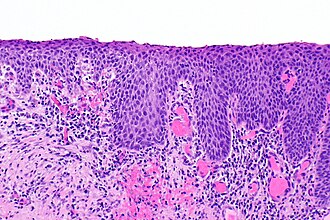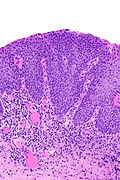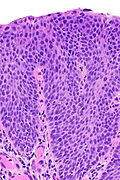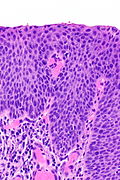Difference between revisions of "Penile intraepithelial neoplasia"
Jump to navigation
Jump to search
(+infobox) |
m (→See also: +SO) |
||
| (9 intermediate revisions by the same user not shown) | |||
| Line 1: | Line 1: | ||
{{ Infobox diagnosis | {{ Infobox diagnosis | ||
| Name = {{PAGENAME}} | | Name = {{PAGENAME}} | ||
| Image = | | Image = Penile intraepithelial neoplasia -- intermed mag.jpg | ||
| Width = | | Width = | ||
| Caption = | | Caption = Penile intraepithelial neoplasia (undifferentiated subtype). [[H&E stain]]. | ||
| Synonyms = | | Synonyms = | ||
| Micro = | | Micro = | ||
| Subtypes = differentiated PeIN, | | Subtypes = differentiated PeIN, undifferentiated PeIN | ||
| LMDDx = [[squamous cell carcinoma of the penis]], [[squamous hyperplasia]] | | LMDDx = [[squamous cell carcinoma of the penis]], [[squamous hyperplasia]] | ||
| Stains = | | Stains = | ||
| IHC = p16 +ve ( | | IHC = p16 +ve (uPeIN) -ve (dPeIN), p53 -ve (uPeIN) +ve (dPeIN) | ||
| EM = | | EM = | ||
| Molecular = | | Molecular = | ||
| Line 16: | Line 16: | ||
| Grossing = | | Grossing = | ||
| Site = [[penectomy grossing]] | | Site = [[penectomy grossing]] | ||
| Assdx = [[HPV]] infection ( | | Assdx = [[HPV]] infection (undifferentiated PeIN), [[lichen sclerosus]] or [[BXO]] (differentiated PeIN) | ||
| Syndromes = | | Syndromes = | ||
| Clinicalhx = | | Clinicalhx = | ||
| Line 39: | Line 39: | ||
==Microscopic== | ==Microscopic== | ||
Subclassified as:<ref name=pmid22641959>{{Cite journal | last1 = Velazquez | first1 = EF. | last2 = Chaux | first2 = A. | last3 = Cubilla | first3 = AL. | title = Histologic classification of penile intraepithelial neoplasia. | journal = Semin Diagn Pathol | volume = 29 | issue = 2 | pages = 96-102 | month = May | year = 2012 | doi = | PMID = 22641959 }}</ref> | |||
*Undifferentiated PeIN (uPeIN). | |||
*Differentiated PeIN (dPeIN). | |||
Note: | |||
*Subclassification similar to one for [[vulvar intraepithelial neoplasia]], that is based on the role of [[HPV]] in the pathogenesis. | |||
===Undifferentiated penile intraepithelial neoplasia=== | |||
Features: | |||
*Increased [[NC ratio]]. | |||
*Multinucleation. | |||
*Lack of maturation to surface - not that useful. | |||
**May have "vertical streaming" - the long axis of the cells are perpendicular to the free surface & basement membrane. | |||
*Apical mitoses. | |||
DDx: | |||
*[[Squamous cell carcinoma of the penis]]. | |||
===Differentiated penile intraepithelial neoplasia=== | |||
Features: | |||
*Thickening of the stratum spinosum ([[acanthosis]]). | |||
*Elongation of rete ridges with bridging/anastomoses between rete ridges. | |||
*[[Nuclear atypia]] - esp. of the basal layer. | |||
*Nuclei in stratum corneum ([[parakeratosis]]). | |||
*+/-Atypical mitoses. | |||
DDx: | DDx: | ||
| Line 46: | Line 70: | ||
*[[Lichen sclerosus]]. | *[[Lichen sclerosus]]. | ||
=== | ===Images=== | ||
<gallery> | |||
Image: Penile intraepithelial neoplasia -- low mag.jpg | uPeIN - low mag. (WC) | |||
Image: Penile intraepithelial neoplasia - alt -- low mag.jpg | uPeIN - low mag. (WC) | |||
Image: Penile intraepithelial neoplasia -- intermed mag.jpg | uPeIN - intermed. mag. (WC) | |||
Image: Penile intraepithelial neoplasia - alt -- intermed mag.jpg | uPeIN - intermed. mag. (WC) | |||
Image: Penile intraepithelial neoplasia -- high mag.jpg | uPeIN - high mag. (WC) | |||
Image: Penile intraepithelial neoplasia - alt -- high mag.jpg | uPeIN - high mag. (WC) | |||
Image: Adjacent parakeratosis and reactive changes -- intermed mag.jpg | Parakeratosis & reactive changes - intermed. mag. (WC) | |||
</gallery> | |||
==IHC== | ==IHC== | ||
*p16 -ve in dPeIN,<ref>{{Cite journal | last1 = Oertell | first1 = J. | last2 = Caballero | first2 = C. | last3 = Iglesias | first3 = M. | last4 = Chaux | first4 = A. | last5 = Amat | first5 = L. | last6 = Ayala | first6 = E. | last7 = Rodríguez | first7 = I. | last8 = Velázquez | first8 = EF. | last9 = Barreto | first9 = JE. | title = Differentiated precursor lesions and low-grade variants of squamous cell carcinomas are frequent findings in foreskins of patients from a region of high penile cancer incidence. | journal = Histopathology | volume = 58 | issue = 6 | pages = 925-33 | month = May | year = 2011 | doi = 10.1111/j.1365-2559.2011.03816.x | PMID = 21585428 }}</ref> +ve in | *p16 -ve in dPeIN,<ref>{{Cite journal | last1 = Oertell | first1 = J. | last2 = Caballero | first2 = C. | last3 = Iglesias | first3 = M. | last4 = Chaux | first4 = A. | last5 = Amat | first5 = L. | last6 = Ayala | first6 = E. | last7 = Rodríguez | first7 = I. | last8 = Velázquez | first8 = EF. | last9 = Barreto | first9 = JE. | title = Differentiated precursor lesions and low-grade variants of squamous cell carcinomas are frequent findings in foreskins of patients from a region of high penile cancer incidence. | journal = Histopathology | volume = 58 | issue = 6 | pages = 925-33 | month = May | year = 2011 | doi = 10.1111/j.1365-2559.2011.03816.x | PMID = 21585428 }}</ref> +ve in uPeIN. | ||
==Sign out== | |||
<pre> | |||
Skin, Penile Lesion, Excision: | |||
- High-grade penile intraepithelial neoplasia (PeIN), undifferentiated type. | |||
-- Margin POSITIVE for PeIN. | |||
</pre> | |||
==See also== | ==See also== | ||
Latest revision as of 17:02, 4 October 2018
| Penile intraepithelial neoplasia | |
|---|---|
| Diagnosis in short | |
 Penile intraepithelial neoplasia (undifferentiated subtype). H&E stain. | |
| Subtypes | differentiated PeIN, undifferentiated PeIN |
| LM DDx | squamous cell carcinoma of the penis, squamous hyperplasia |
| IHC | p16 +ve (uPeIN) -ve (dPeIN), p53 -ve (uPeIN) +ve (dPeIN) |
| Site | penectomy grossing |
|
| |
| Associated Dx | HPV infection (undifferentiated PeIN), lichen sclerosus or BXO (differentiated PeIN) |
| Prevalence | uncommon |
| Prognosis | good |
| Clin. DDx | squamous cell carcinoma of the penis, lichen sclerosis, phimosis |
Penile intraepithelial neoplasia, abbreviated PeIN, is the precursor of squamous cell carcinoma of the penis.
It may be abbreviated PIN;[1] however, this can cause confusion with the prostatic intraepithelial neoplasia (the presursor of prostate carcinoma).
General
- Not very common overall.
- Typically seen adjacent to squamous cell carcinoma of the penis.
Microscopic
Subclassified as:[2]
- Undifferentiated PeIN (uPeIN).
- Differentiated PeIN (dPeIN).
Note:
- Subclassification similar to one for vulvar intraepithelial neoplasia, that is based on the role of HPV in the pathogenesis.
Undifferentiated penile intraepithelial neoplasia
Features:
- Increased NC ratio.
- Multinucleation.
- Lack of maturation to surface - not that useful.
- May have "vertical streaming" - the long axis of the cells are perpendicular to the free surface & basement membrane.
- Apical mitoses.
DDx:
Differentiated penile intraepithelial neoplasia
Features:
- Thickening of the stratum spinosum (acanthosis).
- Elongation of rete ridges with bridging/anastomoses between rete ridges.
- Nuclear atypia - esp. of the basal layer.
- Nuclei in stratum corneum (parakeratosis).
- +/-Atypical mitoses.
DDx:
Images
IHC
- p16 -ve in dPeIN,[3] +ve in uPeIN.
Sign out
Skin, Penile Lesion, Excision:
- High-grade penile intraepithelial neoplasia (PeIN), undifferentiated type.
-- Margin POSITIVE for PeIN.
See also
References
- ↑ Porter, WM.; Francis, N.; Hawkins, D.; Dinneen, M.; Bunker, CB. (Dec 2002). "Penile intraepithelial neoplasia: clinical spectrum and treatment of 35 cases.". Br J Dermatol 147 (6): 1159-65. PMID 12452865.
- ↑ Velazquez, EF.; Chaux, A.; Cubilla, AL. (May 2012). "Histologic classification of penile intraepithelial neoplasia.". Semin Diagn Pathol 29 (2): 96-102. PMID 22641959.
- ↑ Oertell, J.; Caballero, C.; Iglesias, M.; Chaux, A.; Amat, L.; Ayala, E.; Rodríguez, I.; Velázquez, EF. et al. (May 2011). "Differentiated precursor lesions and low-grade variants of squamous cell carcinomas are frequent findings in foreskins of patients from a region of high penile cancer incidence.". Histopathology 58 (6): 925-33. doi:10.1111/j.1365-2559.2011.03816.x. PMID 21585428.






